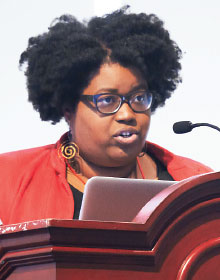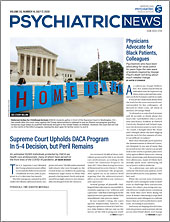As a physician, Etuajie Halbert, D.O., M.S., knows exactly what an individual may be experiencing when a knee is pressed into someone’s neck for 8 minutes and 46 seconds.
It was all she could think about while she knelt for the same amount of time, surrounded by her colleagues, all dressed in white coats, all silent in memory of George Floyd.
“It allowed us to take that 8 minutes and 46 seconds to think about this man’s life,” said Halbert, who is a first-year psychiatry resident at Howard University Hospital and helped organize the demonstration in early June. “As I knelt, I thought about Mr. Floyd, and I thought about the knee digging into his neck for that amount of time. It was difficult to endure.”
More than 50 people participated in the demonstration at Howard University Hospital. It was one of many that occurred across the country as people took to the streets to protest police brutality against Black Americans. Among those protesting and demonstrating were physicians, many of whom have already spent years advocating for racial justice within medicine.
“As a physician, not only are you someone who heals your patient; you’re also an advocate for your patient,” Halbert said.
While the current wave of protests may be a new calling for some in medicine to challenge their unconscious biases, for others, practicing anti-racism advocacy simply means continuing the work they have been doing for years. It means continuing to urge their institutions and colleagues to confront biases that are well established in medicine, including in psychiatry.
And many are hoping that this time, with the protests and renewed calls for action after Floyd’s death, real change within medicine will finally occur.
Aldwin Soumare, M.S., a medical student interested in neuropsychiatry at the Philadelphia College of Osteopathic Medicine-Georgia, said the current protests are a culmination of continued police brutality and the racial disparities that the COVID-19 pandemic has highlighted.
“As humans, we can take only so much,” he said. “It’s inspiring to see physicians in their white coats out there protesting. Physicians are taking a risk—they could lose their jobs, lose their financial stability if their employers don’t like what they’re doing. But we’re seeing the bigger picture. We know we have a voice, and we have to use our platform.”
“I feel motivated,” said Hana Ali, M.D., a fourth-year psychiatry resident at the Yale University Department of Psychiatry. “It feels like we can harness the momentum of what’s happening right now and push forward a really concrete agenda.”
Saying What Needs to Be Said
At Codman Square Health Center in Boston, large posters proclaiming “Black Lives Matter” have been situated on the street outside the clinic and inside the door so patients can see them as they walk in.
“We are a multicultural staff serving a diverse population, and we said ‘Black Lives Matter,’ ” said Jessica Isom, M.D., M.P.H., a psychiatrist at Codman Square Health Center and a voluntary faculty member at Yale School of Medicine. “It has to be said. It has to be thrown in people’s faces. It has to be clear, and it has to be loud and obvious.”
The aversion to talk about race, especially among white people, is a huge obstacle to addressing racial justice, she said. “If we cannot speak about the things that need to be said, if we are afraid of the consequences, then that’s oppressive and stops us from making progress,” she said.
What’s different about the current moment, she said, is that Black physicians are too tired to be afraid of the consequences of speaking up anymore. “We’re exhausted,” she said. “We’re hurt. But if people do their own work, that allows us to have the conversations that need to happen.”
Psychiatrists must find their own motivation to change. “Only people who are internally motivated are going to respond to the messages of the APA town hall [on structural racism], for example,” she said (see
Psychiatric News).
But a potential stumbling block is simply how uncomfortable it is to grapple with their own unconscious biases, Isom pointed out. “As psychiatrists, we study the brain and the mind, and we’re supposed to be the most well versed in managing things like discomfort, uncertainty, and ambiguity,” she said. “But the reason why the field struggles is that we’re humans first and psychiatrists second.”
Counteracting Biases in Psychiatry
For Ayala Danzig, M.D., M.S.W., anti-racism advocacy in medicine started with her involvement with the local White Coats for Black Lives chapter at medical school. Now a fourth-year resident in the Yale University Department of Psychiatry, she continues to advocate by attending protests and reaching out to her state representatives. She is chair of the Assembly Committee of Resident-Fellow Members and the Assembly’s Area 1 resident-fellow member representative.
Tackling racial bias within psychiatry requires action at multiple levels, she said. “We must look at the system to find the problem, but we also have to remember that the system is composed of individual practitioners providing these diagnoses,” Danzig said.
Both Ali and Danzig pointed to racial discrepancies in diagnoses within psychiatry. “The field of psychiatry may be more susceptible to bias because it’s more subjective,” Ali explained. “Our diagnoses are made based on our observations and impressions and not blood tests. Also, for any psychiatric condition, providers can choose from a variety of medications that have different efficacy, price points, and side-effect profiles.”
Danzig has begun to audit her own practice, trying to determine if she is also disproportionately diagnosing Black patients with psychotic illnesses compared with her white patients, for example. “We all think we’re doing a good job, but if we don’t really try to understand the reality on the ground and we don’t understand the history or the role history plays in our current practice, we naturally provide unequal care,” she said.
Ali is the co-chair of the Solomon Carter Fuller Association, a Black resident group at Yale dedicated to creating safe spaces for Black residents and faculty members and trying to advocate to increase diversity within the Department of Psychiatry. Fuller, who was born in Liberia, was the first known African American psychiatrist and a pioneering researcher and educator.
Ali reaches out to Black residents to ensure they feel supported and heard. “I think the problems Black residents face can feel invisible to the larger department, whether it’s micro- or macroaggressions from patients or staff,” she said. “Right now, a lot of residents feel tired,” she continued. “We feel we’ve been saying this for a long time. It’s really nice that people are waking up to it, but it’s also a little demoralizing that people are just waking up to it only now.”
Creating a New Future
Understanding the history of systemic racism in America is a huge part of providing anti-racist care, Danzig said. “Many of our Black patients don’t trust the medical system, and for good reason,” she said. “While it’s true that I wasn’t part of the Tuskegee experiment, for example, I chose to join the House of Medicine, which is an institution that has a legacy for which I am now assuming some responsibility to fight against.”
The next generation of physicians seem to grasp the importance of incorporating anti-racism advocacy into their practices to a greater degree. The group White Coats for Black Lives was started by a group of medical students in 2014.
For Soumare, who is a fourth-year medical student, advocating for racial justice and practicing medicine go hand in hand. “I want to be able to create a dynamic that levels the playing field,” he said.
But racism is a deep-seated problem in both medicine and society as a whole, Ali said. It requires time and persistence to fix. “This is long-term work. There’s no quick solution. We have to keep working at it.” ■


